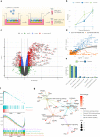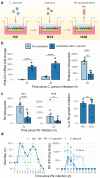Cryptosporidium infection of human small intestinal epithelial cells induces type III interferon and impairs infectivity of Rotavirus
- PMID: 38189373
- PMCID: PMC10793699
- DOI: 10.1080/19490976.2023.2297897
Cryptosporidium infection of human small intestinal epithelial cells induces type III interferon and impairs infectivity of Rotavirus
Abstract
Cryptosporidiosis is a major cause of severe diarrheal disease in infants from resource poor settings. The majority of infections are caused by the human-specific pathogen C. hominis and absence of in vitro growth platforms has limited our understanding of host-pathogen interactions and development of effective treatments. To address this problem, we developed a stem cell-derived culture system for C. hominis using human enterocytes differentiated under air-liquid interface (ALI) conditions. Human ALI cultures supported robust growth and complete development of C. hominis in vitro including all life cycle stages. Cryptosporidium infection induced a strong interferon response from enterocytes, possibly driven, in part, by an endogenous dsRNA virus in the parasite. Prior infection with Cryptosporidium induced type III IFN secretion and consequently blunted infection with Rotavirus, including live attenuated vaccine strains. The development of hALI provides a platform for further studies on human-specific pathogens, including clinically important coinfections that may alter vaccine efficacy.
Keywords: Vaccine; antiviral; co-infection; enteric infection; interferon; mucosal immunity; parasitology.
Conflict of interest statement
No potential conflict of interest was reported by the author(s).
Figures






Update of
-
Cryptosporidium infection of human small intestinal epithelial cells induces type III interferon and impairs infectivity of Rotavirus.bioRxiv [Preprint]. 2023 Sep 6:2023.08.30.555581. doi: 10.1101/2023.08.30.555581. bioRxiv. 2023. Update in: Gut Microbes. 2024 Jan-Dec;16(1):2297897. doi: 10.1080/19490976.2023.2297897. PMID: 37693422 Free PMC article. Updated. Preprint.
References
-
- Kotloff KL, Nataro JP, Blackwelder WC, Nasrin D, Farag TH, Panchalingam S, Wu Y, Sow SO, Sur D, Breiman RF, et al. Burden and aetiology of diarrhoeal disease in infants and young children in developing countries (the Global Enteric Multicenter Study, GEMS): a prospective, case-control study. Lancet. 2013;382(9888):209–222. doi: 10.1016/S0140-6736(13)60844-2. - DOI - PubMed
-
- Checkley W, White AC, Jaganath D, Arrowood MJ, Chalmers RM, Chen X-M, Fayer R, Griffiths JK, Guerrant RL, Hedstrom L, et al. A review of the global burden, novel diagnostics, therapeutics, and vaccine targets for cryptosporidium. Lancet Infect Dis. 2015;15(1):85–94. doi: 10.1016/S1473-3099(14)70772-8. - DOI - PMC - PubMed
-
- Theodos CM, Sullivan KL, Griffiths JK, Tzipori S. Profiles of healing and nonhealing Cryptosporidium parvum infection in C57BL/6 mice with functional B and T lymphocytes: the extent of gamma interferon modulation determines the outcome of infection. Infect Immun. 1997;65(11):4761–4769. doi: 10.1128/iai.65.11.4761-4769.1997. - DOI - PMC - PubMed
Publication types
MeSH terms
Substances
Grants and funding
LinkOut - more resources
Full Text Sources
Medical
Molecular Biology Databases
